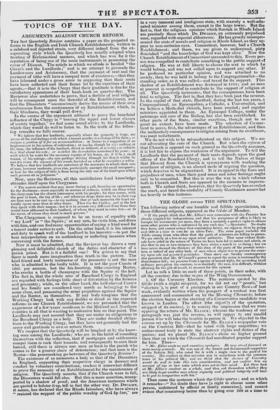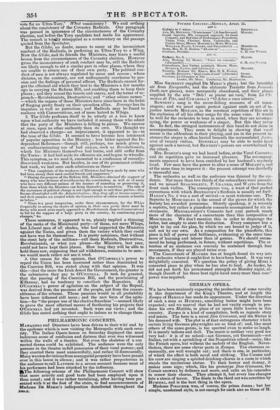THE GLOBE versus THE SPECTATOR.
THE following notice of our humble and fallible speculations, on three different subjects, appeared in the Globe of Monday.
" If the people think that Mr. Ellice's near connexion with the Premier has already crippled his independence, and that his acceptance of office is likely to hamper his movements yet more, they have a certainly a perfect right to choose some other person who is unfettered by any such ties."—Spectator. No doubt they have, and cannot evince that consistency better, we suppose, than by going over 300 at a time to vote for an ultra-Tory. The same paper includes the Globe among those who allow that the Party of ministers are falling to pieces. We are utterly at a loss to say upon what authority. That some violent Radi- cals have aided in the return of Tories we have been led to notice and admit, as also that in one or two instances they have stolen a march in so doing ; but we have never deemed the thinkers of ti-us class of the party of the 'present ters, or indeed of any other body. of men whose object was to govern the coun- try upon safe and practical principles. Once more our Sunday contemporary also perceives that Mr. O'Connell's power to repeal the union is increased by the disturbances bill ; we presume from a species of second sight, for according to.'all ordinary perception the contrary is so decidedly the case, it is difficult, without allowing for the gift aforesaid, to account for this opinion.
Let us talk a little on each of these points, in- their order, with all the courtesy due to the organ of the Whig Government.
1. Of the Coventry Election. The sentence quoted by the Globe (with a slight misprint, for we did not say "people," but "electors"), is part of a paragraph in our Country News of last week, evidently written when the prospect of a contest was first announced and commented on by the Morninc, Chronicle, before the election began or the starting of a Conservative candidate was known in London. The effect (the object?) of the quotation, stripped of its context, is to convey the impression that we were opposing the return of Mr. ELLICE; whereas the tendency of our paragraph was just the reverse, as will appeal to any candid person who will take the trouble to peruse it. We objected to the excuse set up by the Chronicle for Mr. ELLICE'S unpopular vote on the Coercion Bill—that he voted with large majorities; we endeavoured truly to state the abstract rights and duties of the patties; and we placed Mr. Esntes's claim on higher ground than that on which the Chronicle had mendicatcd popular support for him. Thus- " Mr. Ellice needs no such sneaking apologies. He may stand foward on more manly grounds. He was one of the honest and disinterested supporters of the Reform Bill, who voted fbr it with a single view to the good of his country. His conduct on that occasion was in accordance with the common tenor of his political life ; and we think that the electors of Coventry would do well to take this into consideration, and not cashier him on account of one or two votes which were not to their mind. Let them look at Mr. Ellice's conduct as a whole, and then ask themselves whether they are likely to get another man whose capacity and political integrity will bear to be put in comparison with his."
Then came the sentence which the Globe quotes ; and on which it remarks—" No doubt they have [a right to choose some other person, unfettered by official or family connexion], and cannot evince that consistency better than by going over 300 at a time to vote for an Ultra-Tory:' What consistency? We said nothing about the consistency of the Coventry Radicals. Our paragraph was penned in ignorance of the circamstances of the Coventry election, and before the Tory candidate had made his appearance. The remark is totally misapplied as a commentary on the passage quoted from the Spectator. But the Globe, no doubt, means to sneer at the inconsistent conduct of the Radicals, in preferring an Ultra-Tory to a Whig. Now the Globe, and its friends the Ministers, may learn a useful lesson from the circumstances of the Coventry election. However gross the inconsistency of such conduct may be, still the Radicals are likely enough to act a similar part in other places, where they are unable to return one of their own party. The political con- duct of men is not always regulated by sense and reason ; whose dictates, on the contrary, are not unfrequently overborne by pas- sion and the feelings of personal affront. The Radicals cannot for- get the effectual aid which they lent to the Ministers a few months ago in carrying the Reform Bill, and enabling them to keep their places ; and they resent the taunts and sneers, and the terms of re- proach—Revolutionists, Destructives; and "other odious names" —which the organs of those Ministers have since been in the habit of flinging pretty freely on their quondam allies. Revenge has its impulses as well as patriotism; and Radicals may be found to coalesce with Conservatives, out of mere hatred to Whigs.
2. The Globe professes itself to be utterly at a loss to know upon what authority we have included it among those who admit that the party of the Ministers is falling to pieces. We answer at Once, upon no other authority than its own. We thought we had observed a change—an improvement, it appeared to us—in the tone of the Globe. It seemed to have become less intolerant of popular opposition to the Ministry ; less bitter against the In- dependent Reformers—though still, perhaps, too much given to an undiscriminating use of bad names, such as Revolutionists, which the Ministers themselves had borne, and still suffer from the Tories : it had laid aside its offensive air, and begun to wheedle. This symptom, as we read it, amounted to a confession of recently- discovered weakness. But besides, in one of its prominent articles last week, we had seen such admissions as these- " That complaints of the weakness of Ministers had been made by some who had been among their most cordial friends and supporters." "During the progress of the Reform Bill, Ministers obtained the support of many who were desirous of overthrowing the constitution, as well as of many who have very different notions of the manner of amending or preserving it, from those which the Ministers can bring themselves to entertain. The rate of the movement of political change is not rapid enough to suit these parties—they become dissatisfied with the Administration ; they drop off; or become enemies; and their enemies are created while the Conservatives of course remain as hostile as before."
" There is a great temptation, under these circumstances, for the Whigs (especially as among the shades of opinion in their own party there must be many who much more nearly approach to Revolutionists than to Conservatives) to bid for the support of a large party in the country, by announcing great changes," 86c.
These sentences, it appeared to us, plainly implied a thinning of the ranks of the Ministerial party—of those, not mere Whigs, but Liberal men of all shades, who had supported the Ministers against the Tories, and given them the victory which they could not have won for themselves. It is pretty notorious, that without the stout help of the millions—call them Radicals, Destructives, Revolutionists, or what you please—the Ministers, last year, could not have kept their places. How long they will be able to hold them now, supposing that aid withdrawn, remains to be seen: we would much rather not see it tried.
3. Our reason for the opinion, that O'Coreareee's power to repeal the Union has been increased rather than diminished by the Coercion Bill, was stated along with that opinion. It was this—that the more the Irish detest the Government, the greater is the submission they pay to O'CONNELL. It took for granted, that the passing of the Coercion Bill, and the proclaiming of Kilkenny, had no tendency to conciliate the Repealers. All O'CONNELL'S power of agitation. on the subject of the Repeal, was derived from the passions of the people, not from the reason- ableness of the scheme. Those passions would in all probability have been inflamed still more ; and the new form of the agita- tion—for "the proper use of the elective franchise "—seemed likely to prove the most effectual means of furthering his projects that O'CONNELL had yet invented. Such were our views ; and the Globe has stated nothing that ought to induce us to change them.



















 Previous page
Previous page